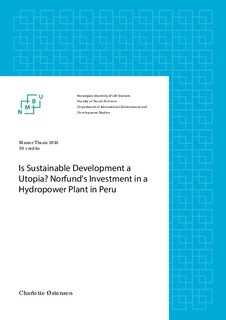Is sustainable development a Utopia? : Norfund's investment in a hydropower plant in Peru
Master thesis
Permanent lenke
http://hdl.handle.net/11250/2398288Utgivelsesdato
2016-08-09Metadata
Vis full innførselSamlinger
Sammendrag
The Norwegian Investment Fund for Developing Countries (Norfund) was established by the Ministry of Foreign Affairs to reduce poverty in developing countries. Norfund is funded through Norway’s development assistance budget and the Norwegian government has extended capital supply annually since 2009 due to increased need to focus on sustainable development. Climate change has become apparent and climate change mitigations are becoming included in business strategies and political policies. Consequently, sustainable development has become the mainstream form of development. Norfund’s projects affect many people and more investments means that more people are impacted by their activities. In 2010 Norfund invested together with Statkraft, through their joint-venture SN Power, in Cheves hydropower plant in Peru. The main objective of this research is to examine the socio-economic impacts from the Cheves project in a sustainable development perspective.
Interviews with local population living in four of the directly affected communities provided information about their perspectives and revealed the impacts through people with first-hand experiences with the Cheves HPP project. Field work in Peru revealed that SN Power impacted many people through acquisition of land during the construction process. Three of four visited communities were negatively impacted due to loss of land, income and social conflicts. Nevertheless, one community experienced exclusively positive outcomes and this was solely due to implementation of social support programs and the absence of direct financial support. SN Power did not use economic capital to obtain land in this community and this resulted in improvement of social, natural, human and economic resources. The findings from this research underline the perception that sustainable development is a process focused on human’s well-being and capabilities without compromising the nature’s ability.
